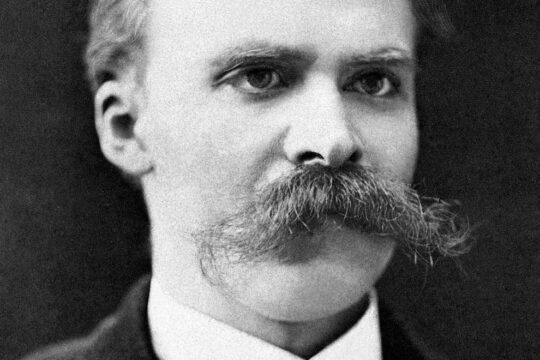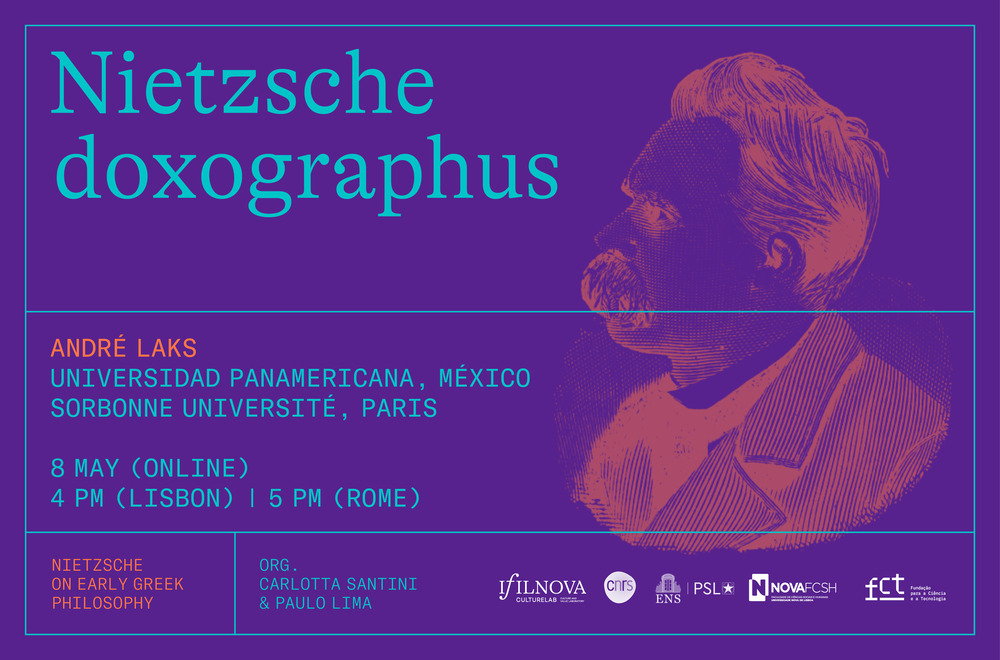
8 de maio | 16:00 (Lisboa)
17:00 (Roma) | para outras localizações, clique aqui.
A 7.ª sessão do Seminário Internacional Nietzsche e os primeiros filósofos gregos estará a cargo de André Laks (Universidad Panamericana, México/Sorbonne Université, Paris), que fará uma apresentação intitulada “Nietzsche bio-doxographus” (resumo em inglês no final da página).
Este seminário procura explorar o diálogo entre Nietzsche e os primeiros filósofos gregos no período em que foi professor de filologia na Universidade de Basileia. Este é um tema que não tem sido estudado de modo sistemático, ainda que existam alguns contributos decisivos que mostram a sua importância para compreender o pensamento filológico e filosófico nietzschiano. O nosso propósito é o de disponibilizar uma plataforma na qual contribuições de especialistas em Nietzsche e em filosofia antiga possam ser apresentadas, debatidas e complementadas, no sentido de colmatar esta lacuna nos estudos nietzschianos. Tópicos centrais das sessões serão a atividade de Nietzsche como estudioso da doxografia antiga sobre os primeiros filósofos gregos, a sua conceção geral daqueles a quem chamou “filósofos pré-platónicos”, bem como a sua interpretação de alguns destes filósofos. O corpo de textos sob foco ao longo das sessões inclui não só os textos publicados, mas também as lições de Nietzsche, os seus cadernos e correspondência. O seminário é parte integrante das atividades do Grupo de Estudos sobre Nietzsche e do Grupo de Pesquisa em Filosofia Antiga. É o resultado de uma colaboração entre o IFILNOVA, o Centre Nationale de Recherche Scientifique e a École Normale Supérieure de Paris. Terá lugar mensalmente a partir de outubro de 2023 e será composto por nove sessões exclusivamente online. Estará aberto a todos os interessados, que se poderão registar para cada uma das sessões contactando os organizadores (plima@fcsh.unl.pt, carlottasantini@hotmail.it).
Org. Paulo Lima (Grupo de Estudos sobre Nietzsche/Grupo de Pesquisa em Filosofia Antiga/IFILNOVA) e Carlotta Santini (CNRS/ENS, Paris)
Abstract
I shall consider Philosophy in the Tragic age of the Greeks (PTG) as a whole, rather than Nietzsche’s interpretation of a particular philosopher. The emphasis will be, then, on the programmatic Preface and the first two sections. In what sense is PGT the «justification of philosophy» it claims to be or, as Nietzsche jots down in a fragment dated from the period of its writing, «The Birth of Tragedy considered from another angle. The confirmation from the philosophy of its contemporary»? I shall suggest that Nietzsche writes PGT with Jakob Burckhardt’s ambivalent attitude to philosophy in mind – philosophy as a positive cultural phenomenon characterized by the emergence of ‘free personality’, on the one hand, philosophical teachings as a doubtful enterprise characterized by its aloofness from the real Greek ethical life, on the other hand. I shall then argue that there is a tension in PTG between a «‘great personality’ centered» history of philosophy and a «dialectical» one, and that this is the reason why not only Diogenes Laertius’ Lives but also Aristotle’s narrative in Metaphysics Alpha stand – formally – at the background of PTG (pretty much as Aristotle’s Poetics stands formally at the background of BT). I shall conclude by explaining what ‘Diogenes Laertius’ is the name of and by the same token suggest a philological solution to the mystery of the ‘three anecdotes’ mentioned at the end of the Preface.

